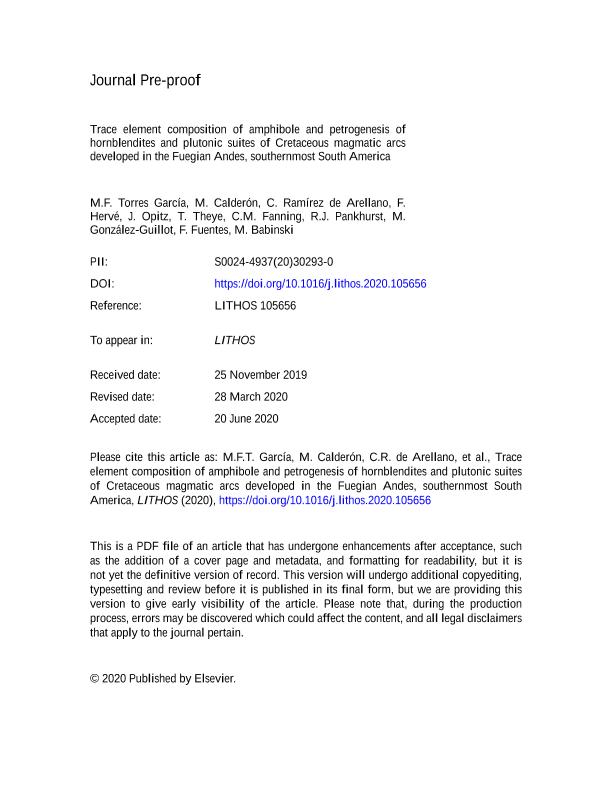Mostrar el registro sencillo del ítem
dc.contributor.author
Torres García, M.F.
dc.contributor.author
Calderón, M.
dc.contributor.author
Ramírez de Arellano, C.
dc.contributor.author
Hervé, Francisco

dc.contributor.author
Opitz, J.
dc.contributor.author
Theye, T.
dc.contributor.author
Fanning, Christopher Mark

dc.contributor.author
Pankhurst, Robert

dc.contributor.author
Gonzalez Guillot, Mauricio Alberto

dc.contributor.author
Fuentes, F.
dc.contributor.author
Babinski, M.
dc.date.available
2021-03-17T12:29:58Z
dc.date.issued
2020-11-11
dc.identifier.citation
Torres García, M.F.; Calderón, M.; Ramírez de Arellano, C.; Hervé, Francisco; Opitz, J.; et al.; Trace element composition of amphibole and petrogenesis of hornblendites and plutonic suites of Cretaceous magmatic arcs developed in the Fuegian Andes, southernmost South America; Elsevier Science; Lithos; 11-11-2020; 1-83
dc.identifier.issn
0024-4937
dc.identifier.uri
http://hdl.handle.net/11336/128453
dc.description.abstract
The evolution of continental crust in convergent margins can be explored in southernmost South America (54-56°S). Plutonic rocks of the Fuegian Batholith and the rear-arc satellite Ushuaia Pluton were emplaced within the magmatic arc and the Fuegian fold-and-thrust belt, respectively. They record subduction zone processes in two distinct tectonic settings during the evolution of the Rocas Verdes Basin. We report new U-Pb zircon geochronology, bulk rock chemistry, Sr-Nd isotope data, and EPMA and in-situ LA-ICP-MS analyses of amphibole from ‘hornblendites’ and gabbroic-granitoid suites in order to evaluate the origin and evolution of the magmatic plumbing systems in the upper plate of the subduction zone. Textural relationships and amphibole compositions in hornblendite indicate crystallization at lower crustal depths with pressures of 7-8 kbar in the Fuegian Batholith and of 5-6 kbar in the Ushuaia Pluton. Lower Cretaceous suites of hornblendite and calc-alkaline hornblende-gabbro, diorite and tonalite in the Fuegian Batholith have εNdt values ranging between +2 and +4. They were emplaced within an island arc coeval with mid-oceanic type spreading in the Rocas Verdes back-arc basin. Isotope ratios and amphibole compositions in hornblendite indicate crystallization from primitive and hydrous sub-alkaline basaltic melts with relatively low LREE/HREE and low alkali contents. The Late Cretaceous plutons in the fold-and-thrust belt were emplaced after the tectonic juxtaposition of Rocas Verdes ophiolitic complexes. The Ushuaia Pluton, consisting of clinopyroxene-hornblende cumulates, hornblende-gabbro, diorite and monzodiorite, was emplaced during the waning stage of Late Cretaceous magmatism. In this case hornblendite amphiboles show high contents of alkalis, LREE and incompatible elements with a strong crustal affinity (Th, Ba, Rb). The enriched incompatible trace element patterns indicate their derivation from K-rich transitional magmas formed in supra-subduction settings. Chemical variations in amphibole from hornblendites and spatially related plutonic rocks are evaluated in terms of fluid flux from the subducted slab and partial melting of the sub-arc mantle, ultimately controlled by the thermal state of the subducted slab and convergence rates.
dc.format
application/pdf
dc.language.iso
eng
dc.publisher
Elsevier Science

dc.rights
info:eu-repo/semantics/openAccess
dc.rights.uri
https://creativecommons.org/licenses/by-nc-sa/2.5/ar/
dc.subject
AMPHIBOLE
dc.subject
CRETACEOUS MAGMATISM
dc.subject
FUEGIAN BATHOLITH
dc.subject
HORNBLENDITES
dc.subject
ROCAS VERDES BASIN
dc.subject
USHUAIA PLUTON
dc.subject.classification
Geología

dc.subject.classification
Ciencias de la Tierra y relacionadas con el Medio Ambiente

dc.subject.classification
CIENCIAS NATURALES Y EXACTAS

dc.title
Trace element composition of amphibole and petrogenesis of hornblendites and plutonic suites of Cretaceous magmatic arcs developed in the Fuegian Andes, southernmost South America
dc.type
info:eu-repo/semantics/article
dc.type
info:ar-repo/semantics/artículo
dc.type
info:eu-repo/semantics/publishedVersion
dc.date.updated
2021-02-17T20:55:43Z
dc.journal.pagination
1-83
dc.journal.pais
Países Bajos

dc.journal.ciudad
Amsterdam
dc.description.fil
Fil: Torres García, M.F.. Universidad Andrés Bello; Chile
dc.description.fil
Fil: Calderón, M.. Universidad Andrés Bello; Chile
dc.description.fil
Fil: Ramírez de Arellano, C.. Universidad Andrés Bello; Chile
dc.description.fil
Fil: Hervé, Francisco. Universidad Andrés Bello; Chile. Universidad de Chile; Chile
dc.description.fil
Fil: Opitz, J.. Universitat Stuttgart; Alemania
dc.description.fil
Fil: Theye, T.. Universitat Stuttgart; Alemania
dc.description.fil
Fil: Fanning, Christopher Mark. The Australian National University; Australia
dc.description.fil
Fil: Pankhurst, Robert. British Geological Survey; Reino Unido
dc.description.fil
Fil: Gonzalez Guillot, Mauricio Alberto. Consejo Nacional de Investigaciones Científicas y Técnicas. Centro Austral de Investigaciones Científicas; Argentina. Universidad Nacional de Tierra del Fuego. Instituto de Ciencias Polares, Recursos Naturales y Ambiente; Argentina
dc.description.fil
Fil: Fuentes, F.. Universidad Central; Chile
dc.description.fil
Fil: Babinski, M.. Universidade de Sao Paulo; Brasil
dc.journal.title
Lithos

dc.relation.alternativeid
info:eu-repo/semantics/altIdentifier/url/https://linkinghub.elsevier.com/retrieve/pii/S0024493720302930
dc.relation.alternativeid
info:eu-repo/semantics/altIdentifier/doi/http://dx.doi.org/10.1016/j.lithos.2020.105656
Archivos asociados
